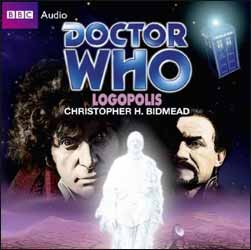|
Click here to return to the main site. Audio Book Review
In theory, the TARDIS should be able to change its appearance to blend in unobtrusively wherever it happens to materialise. In practice, however, because of a fault in the chameleon circuit, it always looks like a police box - a minor inconvenience the Doctor hopes to correct. Fixing the mechanism involves a visit to Earth and a trip to the planet Logopolis - normally a quiet little place that keeps itself to itself. However, on this occasion the meddling presence of the Doctor’s arch-enemy, the Master, ensures the disruption of normality. Even the Master is horrified by the threat of total chaos he unintentionally precipitates - until he finds a way to turn the imminent destruction of the universe to his own advantage... I love Logopolis. From the funereal atmosphere generated by Peter Grimwade’s direction and Paddy Kingsland’s music, to the lighter moments created by Tom Baker’s ad-libs (“What vehicle?” he utters, as the Doctor thinks the police officer might be referring to his TARDIS, followed by a prolonged and highly suspicious “Noooooo,” when the officer indicates the nearby sports car), this story has a special place in my heart. I even enjoy Kingsland’s struggle to create a sound that is different from his work on The Hitchhiker’s Guide to Galaxy (when the Doctor tells Adric about Earth, I always expect the Alzarian to say, “What a dull name.”)! Of course, Grimwade and Kingsland’s contributions are not present in this audio book, and neither is the voice of Baker. Instead, writer Christopher H. Bidmead reads his own unabridged novelisation of his television script. However, the sense of impending doom remains, courtesy of the author’s insights into the minds of his characters, such as the Doctor’s fear when he first beholds the ethereal figure of the Watcher. So does the mind-blowing wonder of the dimensional anomaly caused by a TARDIS materialising inside another TARDIS: on screen, the illusion was created by reduced lighting and echoing sound; here, the author describes a drop in temperature as the Doctor and Adric stray deeper and deeper into the seemingly endless series of police boxes. We also gain a great deal in the novelisation. The lost Baker ad-libs are more than made up for by additional lines of dialogue, especially between the Doctor and Adric, and incidents such as Tegan and Aunt Vanessa’s near-collision with a lorry. Bidmead clarifies certain matters that had left television viewers either confused or annoyed: there is an explanation for why the Doctor and Adric press on into the endless TARDISes rather than simply turn back the way they have come; the plan to flush out the Master makes a bit more sense; and the nature and origin of the Watcher is made more explicit. The authorial voice takes a philosophical attitude to the science involved and the interconnectedness of things, reading a little like Douglas Adams (Bidmead’s predecessor as the show’s script editor) in a more serious frame of mind. The book was originally published in 1982, at a time when Target Books was increasingly turning to the stories’ original writers to pen the novelisations, taking some of the burden from Terrance Dicks, who, just a year earlier, had been churning out most of them by himself. Bidmead takes a leaf from Dicks’s book in terms of structure, dividing his narrative into twelve chapters, with each episode of the television script forming three chapters. This structure allows the audio book to be split evenly over four discs, with each one-hour CD containing one episode’s worth of story. In a bid to be different from Dicks, however, Bidmead does not give his chapters titles. He also strives not to plagiarise Dicks’s trademark description of the TARDIS’s “wheezing, groaning” sound, instead opting to have the craft materialise and dematerialise with a “whirring, chuffing” noise. This can lead to some unintentional humour, as can the Fifth Doctor’s first words, which do sound rather Pythonesque. Bidmead, who was an actor before he became a full-time writer, is a good choice of reader, bringing appropriate amounts of gravitas and humour where needed. He is good at distinguishing the voices of his various characters, though his Australian accent for Tegan is sometimes rather overdone and his Doctor occasionally sounds more like Roger Moore than Tom Baker. For the first time in this series, the cover illustration is not one that has previously appeared on a Target Books edition. Instead, this four-disc pack boasts a new cover by Ben Willsher, presumably with the intention of giving this and the audio book release of the follow-up Castrovalva a consistent look while also avoiding Castrovalva’s original photographic cover. Logopolis retains a special place in my heart. So does the novelisation, one of the few that I ever made the effort to read for a second time. Now so too does this audio reading. 9 Richard McGinlay Buy this item online
|
|---|

